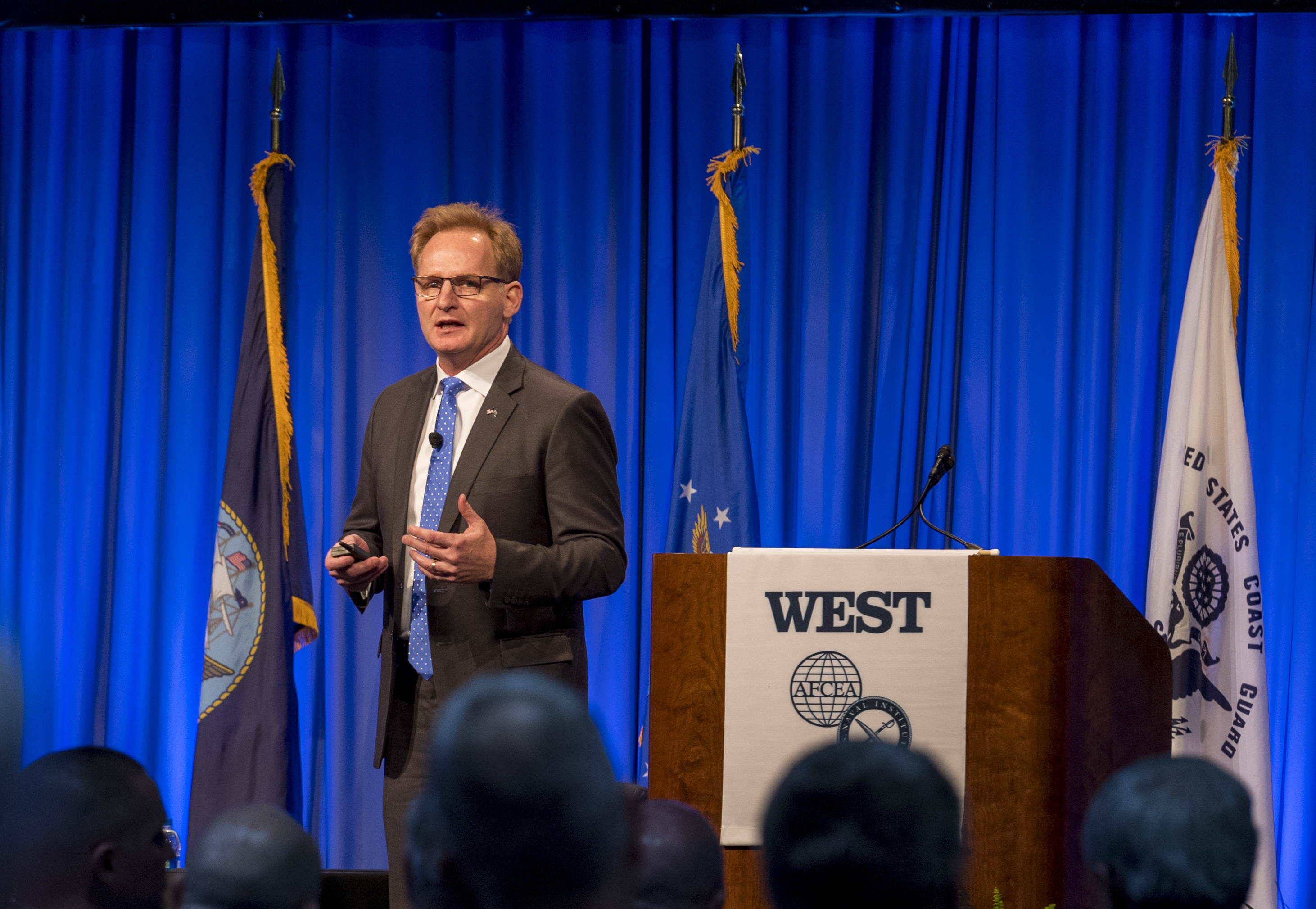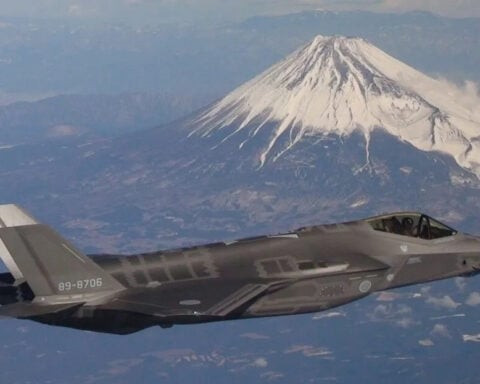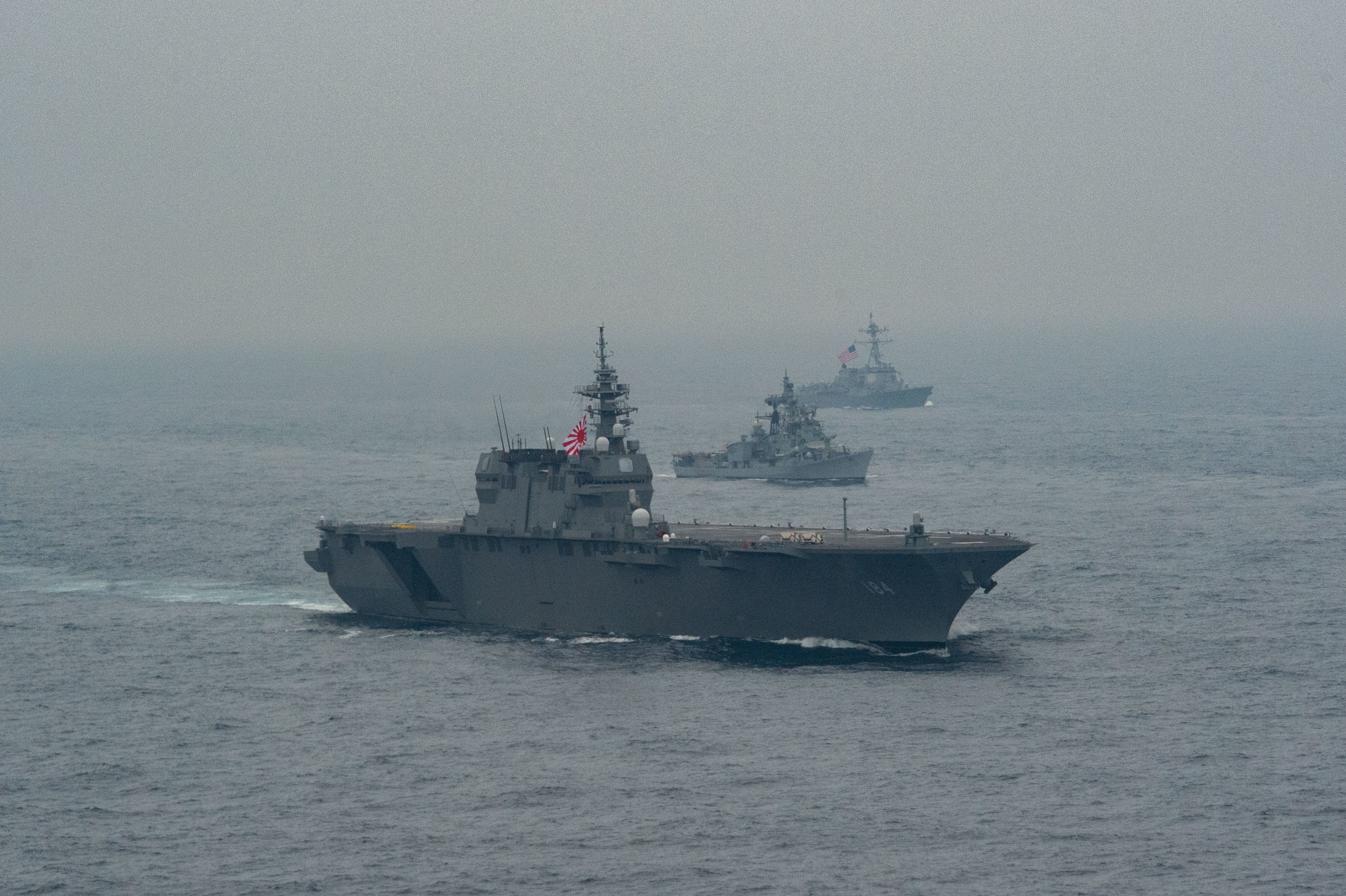
SAN DIEGO, Calif. — The Navy needs to “radically change” the way it does business if it wants to survive in an era of military competition with Russia and China, the service’s number-two civilian said on Wednesday.
“We have to radically change how we think about and how we execute within the naval forces, how we train our people, what we expect from our people, what we expect from our manufacturing base, our acquisition processes,” Under Secretary of the Navy Thomas Modly said at WEST 2019, co-hosted by the U.S. Naval Institute and the Armed Forces Communications and Electronics Association.
He wants to see the Navy build trust between the force, the manufacturing base and allies; move quickly to action; collaborate better and have greater visibility and transparency of information and data; become more adaptable; innovate; and be humble “and recognize the deficiencies that we have.”
For starters, fleet size remains one of the Navy’s biggest challenges. There’s “no decrease in operational requirements, and yet there are not enough ships to do the mission,” he said.
The stress on the ships operating have pushed crews to their limits with disastrous effects, he said.
“We’ve seen some of the ramifications of that with fatigued crews, and unfortunately it manifested itself in some tragedies for us in the last couple of years,” Modly said. “So (it’s) a big problem for us, and we’re looking at what that future force structure might look like and try to invest in that.”
Modly wants to tackle other challenges, modernizing the Navy’s legacy business operations and associated business systems and practices. Examples include audits and real-property inventories that already are yielding surprising findings on missing spare parts and unreported buildings. Those are particular areas of interest to Modly, a former Navy UH-1N Huey helicopter pilot and U.S. Naval Academy graduate. He also made several changes in the department’s senior structure, including a new chief management officer, since taking office managing the department.
The Navy has asked Congress to establish the position of assistant secretary of the Navy for information management, he said.
“We feel we have to elevate the leadership and management of that to the secretariat level and be able to also use the power of that office to recruit somebody really, really credible – possibly from the private sector but not necessarily,” he added.
Modly had other observations from his 14-month tenure:
- The $13-billion aircraft carrier: That’s the cost of the Navy’s planned buys for the Ford-class aircraft carrier. In the service’s resource-constrained budget, $13 billion “is a lot of money,” Modly said, and amid concerns about additional belt-tightening in Washington “that’s a big issue for us.” But a two-carrier buy, he said, made sense as it locks in the per-carrier cost, and the deal is expected to save $4 billion in costs from separate buys as well as $200 million saved from avoiding modifications that typically arise and require retrofits to the second carrier.
- Russian revanchism: Russia’s penchant to strengthen its federation with expansion into past, lost republics, pushed by its aggressive leader “is testing us in ways that we have not been tested before – sort of on the edges, on the periphery, using all types of asymmetric types of approaches to make us feel uncomfortable, make our allies feel uncomfortable.”
- Great power competition on the high seas: The rapid rise and growth of China’s naval reach in barely 20 years has changed the landscape where U.S. forward-deployed naval forces have long operated, especially within the 7th Fleet region.
- Chinese mercantilism: China’s global expansion, fueled by its economic growth and it’s “One Belt, One Road” initiatives, is dwarfing and affecting U.S. influence in some places like the South Pacific. “What they are doing to expand their influence around the world is quite striking and stunning and something we should be very concerns about,” he said. On a visit last summer to an island in Micronesia, Modly met a team of 24 Navy Seabees who built a small schoolhouse. The plywood-and-concrete building was dwarfed by massive nearby agricultural center under construction and funded by China. Many local leaders say “they would rather have us, frankly,” he added. But in poorer nations, many with significant infrastructure needs, China’s open checkbook “is very, very enticing to them.”
- Escalating healthcare costs: Congress has asked the services to reorganize how they deliver military medicine, with an eye on shrinking budget costs in the care given to service members and their families. It’ll eventually all fall into the Defense Health Agency. “It’s being implemented right now, but I will tell you, it is not going smoothly,” he said. Much discussion continues of how it’s going to work “and who, ultimately, is responsible for readiness, and there’s lots of debates going on around that. That’s been heavily on our minds in the department.”
- Educating for uncertainty: The recently-announced initiative to revamp sailors’ education and training, called “Educating for Seapower,” aims to invest in and create a strategy for how the Navy educates its sailors and Marines, from enlisted through the officer ranks. Their education is “going to be our competitive advantage. We can protect our technology… (and) our intellectual capital only so far,” he said. The Navy’s work will look at developing technical skills and training and help build strategic thinkers, he added.
- Cyber espionage: “We are in the midst of conflict right now, with major competitors around the world,” he said. “They are coming at us through our networks, through our vulnerabilities, and they are stealing from us. They are stealing intellectual capital and they are bankrupting companies – and they are doing this without any type of response that is stopping them right now.” It’s critical, he added, as vulnerabilities mean “we may not even be able to get our ships underway, even out of San Diego if they hit us in a certain way, so we have to take this very seriously.”
- Artificial intelligence: The growth and expanding use of AI technology is challenging the Navy in many areas and across multiple functions. “How are we going to integrate that? How are our adversaries going to integrate that? Are we going to make that part of our warfighting mission?” he said.
Those challenges exist in a domestic and global economic environment that has changed in ways that may threaten the capability of the U.S. to well position its forces against those threats, Modly said.
The effects from the shrinking U.S. manufacturing and industrial base are stark. Only one U.S. company makes thin wall castings used on rotary-wing aircraft gearboxes, he said, “and it’s in bankruptcy right now.” Only one U.S. company makes and repairs ship and submarine propeller shafts, and only one U.S. company makes the rocket propellant used in U.S. rockets and weapons. China is the top importer and users of machine tools; the U.S. is sixth, “a leading indicator” of China’s future intents. Ninety percent of printed circuit boards are manufactured in Asia, with half made in China.
In addressing all these challenges, Modly said the Navy needs to better articulate the reason for investments such as costly aircraft carriers and explain to the American public why those priorities are important. “We are trying to do a much better job at that,” he said. “But it is one area that I’m not satisfied we are doing a good job… I’m also really concerned that we are getting disconnected from the people that we serve,” he said, “because we can become very insular.”
A new narrative and outreach efforts underway aim to explain what the Navy does and provide the nation and its role in providing national security. “I think that connection to the average citizen has not been made very well,” he said. “But it can be, because it’s a pretty compelling story. I just don’t think we’ve done a great job with it.”





